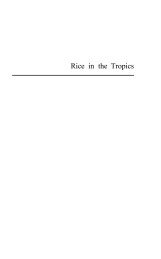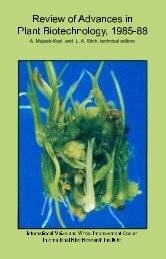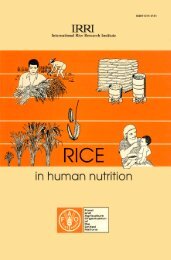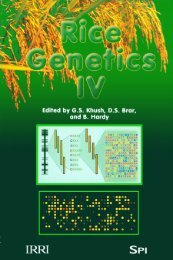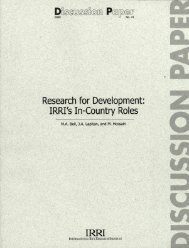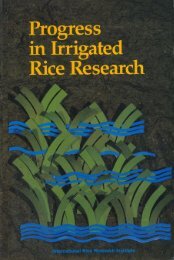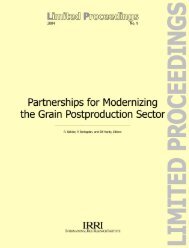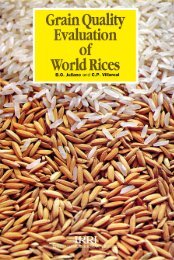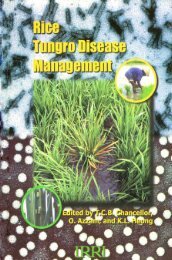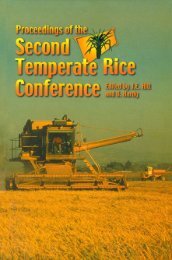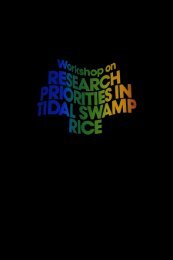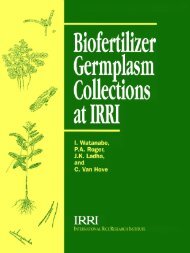- Page 2 and 3:
1990 Supplement Publications of the
- Page 4 and 5:
Contents Part 1 Consultative Group
- Page 6:
Part III Deutsche Gesellschaft fur
- Page 10 and 11:
CGIAR Consultative Group on Interna
- Page 12 and 13:
Centro lnternacional de Agricuttura
- Page 14:
the CGlAR centers and their collabo
- Page 17 and 18:
General lnformation 1 The Centro ln
- Page 19 and 20:
Annual Reports ClAT Bean Program Be
- Page 21 and 22:
includes author and subject indexes
- Page 23 and 24:
CIAT Cassava information Center Abs
- Page 25 and 26:
ClAT Unidad de Apoyo en Comunicacio
- Page 27 and 28:
EMATERCE-EPACE-CIAT Superbrotamento
- Page 29 and 30:
Tripp, R. y Woolley, J. La Etapa de
- Page 31 and 32:
Programa de Pastos Tropicales del C
- Page 33 and 34:
Pérez-Crespo, C.A. (Editor) Integr
- Page 36 and 37:
CIP lnternational Potato Center Cen
- Page 38 and 39:
instructions for ordering 1. Prices
- Page 40 and 41:
You can order certain CIP publicati
- Page 42 and 43:
GERMPLASM MANEJO DE GESTION DU MANA
- Page 44 and 45:
International Potato Center US$ 1.2
- Page 46 and 47:
Booth, R., Shaw, R. Principios de a
- Page 48 and 49:
Working Papers ISSN 0256-8748 US$ 1
- Page 50 and 51:
CIMMYT Centro lnternacional de Mejo
- Page 52 and 53:
search programs, a summarized finan
- Page 54 and 55:
productivity of resources devoted t
- Page 56 and 57:
Pakistan Agricultural Research Coun
- Page 58 and 59:
Proceedings S.R. Waddington, A.F.E.
- Page 60:
ways to develop the collaborative m
- Page 63 and 64:
General Information The Internation
- Page 65 and 66:
Pigeon Pea (IBPGR/ICRISAT - in prep
- Page 68 and 69:
ICARDA International Center for Agr
- Page 71 and 72:
Genetic resources program: annual r
- Page 73 and 74:
E.F. Thomson, F.A. Bahhady, and A.
- Page 75 and 76:
LENS Newsletter Vol 13, no. 2, 45 p
- Page 77 and 78:
lCARDA Annual Report 1987 76 pp. En
- Page 79 and 80:
ICARDA annual report 1988 117 pp. E
- Page 81 and 82:
D.J. Rees, F. Rehman, A. Samiullah,
- Page 83 and 84:
A. Ali and S. Ahmed Germplasm evalu
- Page 85 and 86:
Morocco B.P. 6299 Rabat lnstituts -
- Page 87 and 88:
General Information ICRISAT is one
- Page 89 and 90:
Books K.O. Rachie The millets: impo
- Page 91 and 92:
Information Bulletins No. 23 M.V.K.
- Page 93 and 94:
This colorfully illustrated publica
- Page 95 and 96:
methodologies, and results on agrof
- Page 97 and 98:
Rapport sommaire et recommandations
- Page 99 and 100:
Coordination of research on peanut
- Page 101 and 102:
Linking grain legumes research in A
- Page 103 and 104:
particularly, the Sudano-Sahelian z
- Page 105 and 106:
Catalogues de publications de I'ICR
- Page 107 and 108:
Vegetable pigeonpea: a promising cr
- Page 109 and 110:
No. 17 Sorghum variety ICSV 145 (PM
- Page 112 and 113:
IFPRl International Food Policy Res
- Page 114 and 115:
No. 62 Ram P. Yadav Agricultural Re
- Page 116 and 117:
which drew resources to the coffee
- Page 118 and 119:
No. 75 Joachim von Braun, Detlev Pu
- Page 120 and 121:
Jock R. Anderson and Peter B.R. Haz
- Page 122 and 123:
These collected papers represent pa
- Page 124 and 125:
No. 3 Patrick Webb lntrahousehold D
- Page 126 and 127:
No. 2 Liborio S. Cabanilla Trends a
- Page 128 and 129:
llTA International Institute of Tro
- Page 130 and 131:
grain legume improvement; internati
- Page 132 and 133:
Natalie D. Hahn (ed.) in Praise of
- Page 134:
International Institute of Tropical
- Page 137 and 138:
I LCA ILCAs formal mandate is ... t
- Page 139 and 140:
P.A. Konandreas and F.M. Anderson I
- Page 141 and 142:
J.M. King ILCA Research Report 7. L
- Page 143 and 144:
K. Agyemang and L.P. Nkhonjera llCA
- Page 145 and 146:
Reviews the trends in the productio
- Page 147 and 148:
J.C.M. Trail, C.H. Hoste and Y.J. W
- Page 149 and 150:
effects of nutrition, genetics, her
- Page 151 and 152:
for different animals, and their co
- Page 153 and 154:
feed intake and its prediction, sec
- Page 155 and 156:
important recommendations for futur
- Page 157 and 158:
Ethiopia, the information and techn
- Page 159 and 160:
M.H. Butterworth, Michael Hailu, Ma
- Page 161 and 162:
The first supplement to ILCA in Pri
- Page 163 and 164:
lndex to livestock literature micro
- Page 165 and 166:
Network publications are available
- Page 168 and 169:
ILRAD International Laboratory for
- Page 170 and 171:
ized, and scientific articles and o
- Page 172 and 173:
International Laboratory for Resear
- Page 174 and 175:
sented their work on antigenicity i
- Page 176 and 177:
protein assembly, protein degradati
- Page 178 and 179:
This report is of a mission made to
- Page 180 and 181:
IRRI International Rice Research In
- Page 182 and 183:
2. Surface mail delivery to most de
- Page 184 and 185:
Technology and Livelihood Resource
- Page 186 and 187:
Research Highlights International R
- Page 188 and 189:
The book provides complete dynamic
- Page 190 and 191:
IRRl and Academia Sinica, cosponsor
- Page 192:
Overseas Philippines Per Copy Air S
- Page 195 and 196:
General lnformation The Internation
- Page 197 and 198:
ISNAR dans les Années 1980 Avril 1
- Page 199 and 200:
Rapport Annuel 1986 Août 1987. Tra
- Page 201 and 202:
Travalller au Renforcement des Syst
- Page 203 and 204:
Selected issues In Agricultural Res
- Page 205 and 206:
Workshop Proceedings - The Planning
- Page 207 and 208:
PROAGRO Paper NO. 3. Las Funclones
- Page 209 and 210:
Working Paper No. 5. Agricultural R
- Page 211 and 212:
Documnt de Travail No. 20. Pianific
- Page 213 and 214:
Case Study No. 3 - BANGLADESH - The
- Page 215 and 216:
Linkage Theme No. 5: The effect of
- Page 217 and 218:
R7e. Agricultural Research in Ivory
- Page 219 and 220:
R39. Computer Acquisition and Devel
- Page 221 and 222:
Latin America and Caribbean R3s. El
- Page 223 and 224:
General Information The West Africa
- Page 225 and 226:
goal, its operational mandate and o
- Page 228 and 229:
AVRDC Asian Vegetable Research and
- Page 230 and 231:
Agribookstore 1161 N. Kent Street S
- Page 232 and 233:
S. Shanmugasundaram and B. T. McLea
- Page 234 and 235:
ICLARM International Center for Liv
- Page 236 and 237:
To publish and disseminate research
- Page 238 and 239:
The full papers were presented unde
- Page 240 and 241:
G.M. Hallegraeff and J.L. Maclean (
- Page 242 and 243:
J.L. Maclean, R.M. Temprosa, N.I. J
- Page 244 and 245:
F.C. Gayanilo, Jr., M. Soriano and
- Page 246 and 247:
B.A. Costa-Pierce, Rusydi, A. Safar
- Page 248 and 249:
Proceedings of the Second Asian Fis
- Page 250 and 251:
ICRAF International Council for Res
- Page 252 and 253:
- Science and Practice of Agrofores
- Page 254 and 255:
The 244 references contained in thi
- Page 256 and 257: P.A. Huxley and S.B. Westly (Editor
- Page 258 and 259: This is a review of the potential o
- Page 260 and 261: tural Environments: Characterizatio
- Page 262 and 263: Bourke, R.M. (1984). Food, coffee a
- Page 264 and 265: Hoekstra, D.A. (1985). The use of e
- Page 266 and 267: WINROCK WINROCK International Insti
- Page 268 and 269: Presents the viewpoints of key poli
- Page 270 and 271: Douglas Horton Potatoes: Production
- Page 272 and 273: GTZ Deutsche Gesellschaft fur Techn
- Page 274 and 275: On average in any given year the GT
- Page 276 and 277: Regional Rural Development Kropp, E
- Page 278 and 279: Vulgarisation agricole. Tome 1: Bas
- Page 280 and 281: Kisselmann, Erwin (editor) Gutachte
- Page 282 and 283: Landwirtschaftliche Entwickiung Wes
- Page 284 and 285: Farm Mechanization Training Centre
- Page 286 and 287: The socio-economic impacts of the d
- Page 288 and 289: Abrégé de production cunicole ten
- Page 290 and 291: Neumaier, Thomas (editor) Mokwa Cat
- Page 292 and 293: Handbook for Field Trials in Techni
- Page 294 and 295: AI-Hubaishi, A. and Müller-Hohenst
- Page 296 and 297: Pest Control in Developing Countrie
- Page 298 and 299: Dorow, Eberhard Hielicopter in Gras
- Page 300 and 301: La Defense des Cultures en Afrique
- Page 302 and 303: Schmutterer, Heinz and Ascher, K.R.
- Page 304 and 305: Homann, Jürgen and Zettelmeyer, Wi
- Page 306: Dudek, Siegfried; Förster, Bernhar
- Page 311 and 312: GENERAL PUBLICATIONS International
- Page 313 and 314: PERIODICALS IlMl Review The Institu
- Page 315 and 316: Asian Development Bank and Internat
- Page 317 and 318: This publication provides a synthes
- Page 319 and 320: COUNTRY PAPERS Country papers are s
- Page 321 and 322: management principles can be applie
- Page 323 and 324: CASE STUDIES Honorio B. Bautista Ex
- Page 325 and 326: David Groenfeldt, Joe Alwis and Jay
- Page 328 and 329: AClAR Australian Centre for Interna
- Page 330 and 331: additional pests, and the six pests
- Page 332 and 333: incurred by the invasion of the wee
- Page 334: These proceedings arise from a work
- Page 337 and 338: F.F.T.C. Book Series F.F.T.C. is an
- Page 339 and 340: can develop practical and efficient
- Page 341: There is now a growing interest in



